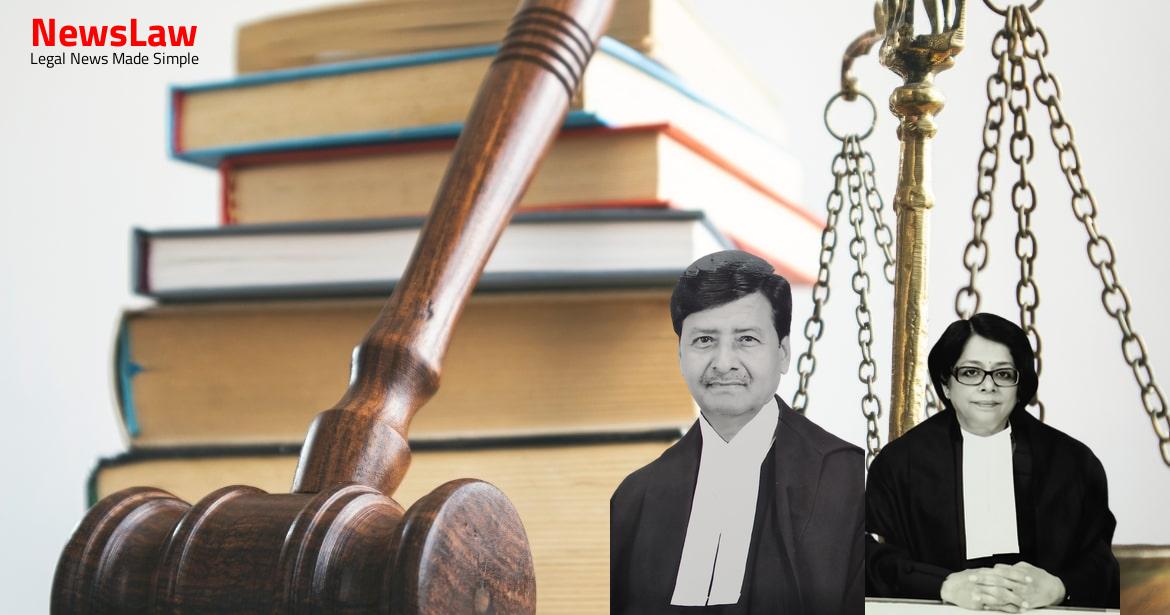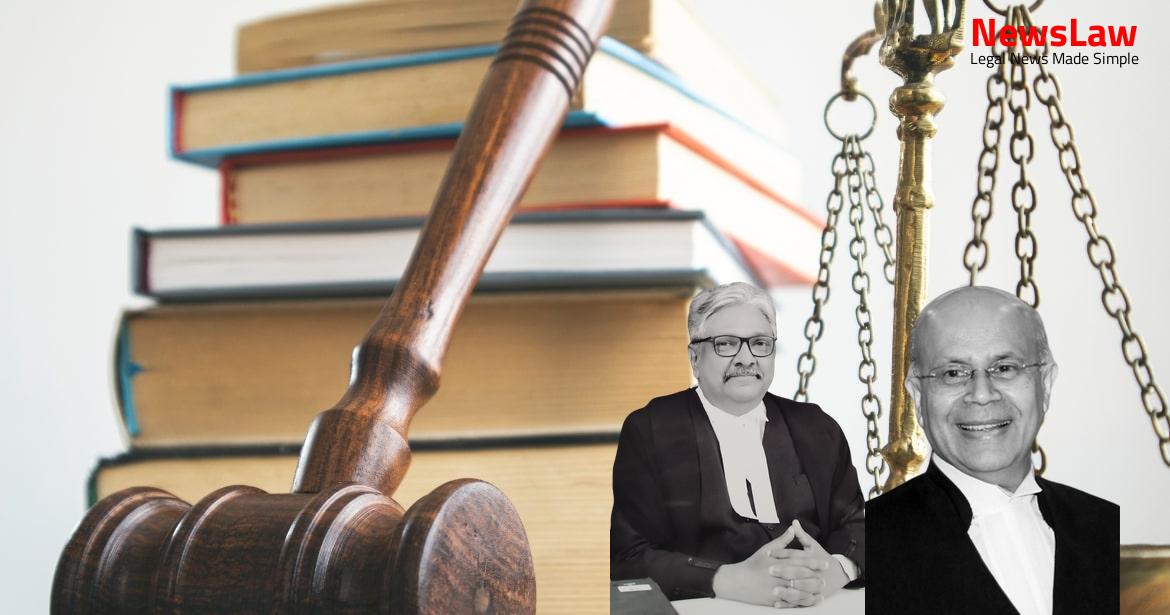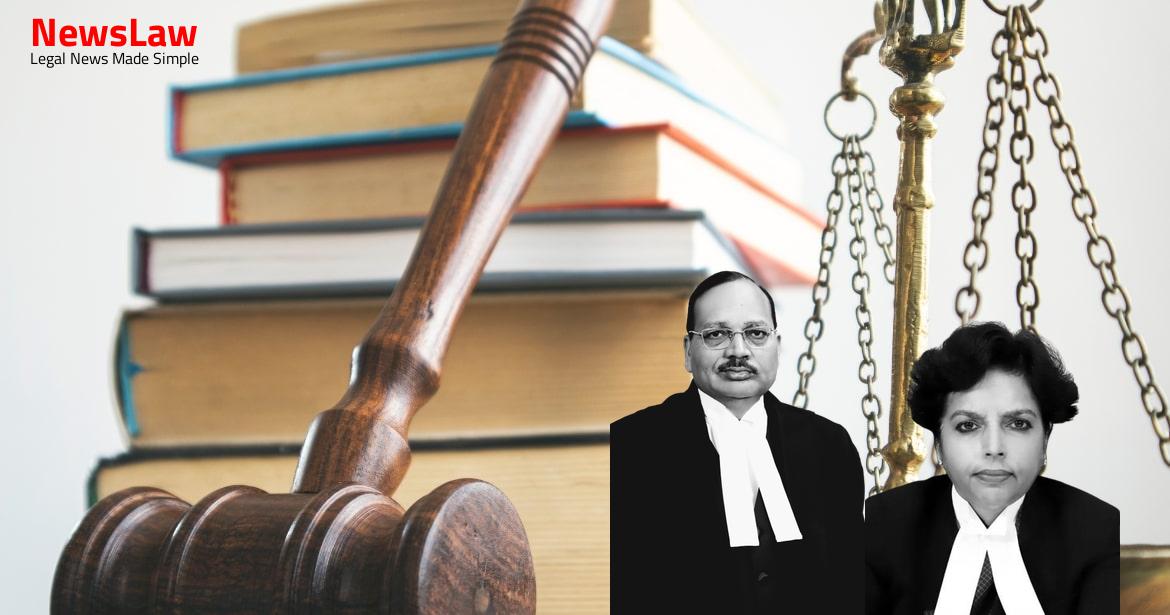Explore the critical legal analysis undertaken by the court regarding the presumption under Section 139 of the Act in cases of dishonored cheques. Discover how the burden of proof shifts to the accused to disprove the existence of consideration and debt, and the standard of ‘preponderance of probabilities’ required. Follow along for a comprehensive understanding of the judicial perspective on proving or rebutting the presumption in such regulatory offenses.
Facts
- The appellant approached the complainant to purchase non-woven fabric.
- Legal notices were sent to the appellant on two addresses.
- Non-woven fabric was sold to the appellant through invoices and delivered via public carrier trucks.
- Cheques issued by the appellant to meet the liabilities bounced due to insufficient funds.
- The complainant filed complaints under Section 138 of the Act against the appellant.
- The appellant claimed innocence and false implication but did not present any defense evidence.
- Witness testimonies and documentary evidence were presented to prove the case against the appellant.
- Trial court found acquittal of the appellant challenged by the complainant.
- No evidence recorded to disprove the presumption in defense.
- Trial judge found that complainant failed to establish delivery of goods/material in exchange for which cheques were issued.
- High Court affirmed that complainant proved issuance of cheques in lieu of material supplied with documentary evidence.
- Appellant’s burden to rebut the presumption under Section 139 of the Act was not fulfilled.
- Appellant only recorded statement under Section 313 of the Code.
Also Read: Legal Case: Sentence Reduction in Non-Compoundable Offence
Arguments
- Learned counsel for the appellant relied on the judgments in K. Prakashan vs P.K. Surenderan and Indus Airways Private Limited Vs. Magnum Aviation Private Limited.
- The appellant created doubt on the non-existence of debt or liability with material on record, leading to a finding of guilt under Section 138 of the Act by the trial court.
- Appellant’s counsel argued that the burden was on the complainant to prove receipt of goods against which the cheques were given as security.
- Counsel further contended that the High Court’s finding in the impugned judgment on Sections 118(a), 138, and 139 of the Act was contrary to settled legal principles.
- However, it was noted that in cases under Section 138 of the Act, the prosecution must prove the case based on ‘preponderance of probabilities’, not ‘beyond reasonable doubt’.
- Mere issuance of cheques by the appellant did not automatically prove discharge of debt or liability without the complainant discharging prima facie burden.
- The High Court was cautioned against reversing the trial court’s acquittal without sufficient grounds like perversity or non-consideration of relevant material.
- Statutory notice issued to the appellant went unanswered
- Cheques issued by the appellant got dishonoured due to insufficient funds
- Complainant’s counsel argued that the cheques were issued in reference to invoices after goods were delivered
- Material on record supported that the cheques were issued in lieu of goods delivered
Also Read: Recovery of Misappropriated Temple Funds: Court’s Legal Analysis
Analysis
- 1.2
- Section 139 of the Act creates a rebuttable presumption that cheques are issued for consideration.
- Accused must raise a defense to contest the existence of a legally enforceable debt or liability.
- The initial presumption favors the complainant in cases of dishonored cheques.
- The presumption under Section 139 prevents undue delays in litigation.
- The burden of proof is on the accused to disprove the existence of consideration and debt.
- The standard of proof required is ‘preponderance of probabilities.’
- The appellant failed to disprove or rebut the presumption under Section 139.
- The court may not insist on the accused to disprove the non-existence of consideration with direct evidence as negative evidence is not possible.
- The offense under Section 138 of the Act is a regulatory offense with a quasi-criminal nature.
- The accused must bring forward facts and circumstances to shift the burden of proof onto the complainant.
- The complainant demonstrated all essential ingredients under Sections 118 and 139, shifting the burden onto the accused.
- Section 139 of the N.I. Act creates a presumption in favor of the holder of a cheque that it was received for the discharge of a debt or liability.
- The burden of proof shifts to the accused to rebut this presumption under Section 138 of the Act.
- The accused must prove by preponderance of probabilities that the cheque was not issued for the discharge of any debt or liability.
- The standard of proof required to rebut the presumption is that of preponderance of probabilities.
- In the case of Uttam Ram vs. Devinder Singh Hudan and Another, the Court examined the existence of consideration and debt as necessary elements in cases involving Section 138 of the Act.
- The accused in a trial under Section 138 of the Act has two options: either show that consideration and debt did not exist, or demonstrate that under the circumstances, the non-existence of consideration and debt is so probable that a prudent individual would assume they did not exist.
- The Court referenced the case of Rohitbhai Jivanlal Patel vs State of Gujarat and Another to discuss the scope of Sections 138 and 139 of the Act.
- The principles in the Kumar Exports v. Sharma Carpets case were cited as relevant guidelines for cases under Section 138 of the Act.
- Appellant failed to establish a legally enforceable debt or other liability on the date of drawal of the cheque as per Section 138 of the Act.
- Counsel for the appellant informed that the client is unwilling to pay the stated amount and prefers to argue the case on merits.
- Order was reserved on 05 March, 2021 with an opportunity for the appellant to reconsider by 06 March, 2021 as mentioned in the order of 01 March, 2021.
Also Read: Determining Seniority in Delayed Appointments: Legal Analysis
Decision
- The High Court’s finding of guilt of the appellant and conviction under Section 138 of the Act was upheld.
- The appeals were deemed without substance and dismissed.
- Bail bonds were cancelled, and the appellant was directed to either pay the fine or serve the sentence.
- Pending applications were disposed of.
- The appellant expressed interest in knowing the outcome of the appeals on merits.
- On 01 March, 2021, counsel was directed to confirm if the appellant was ready to make payment of the stated cheque amounts.
- Further hearing was scheduled for 05 March, 2021.
Case Title: SUMETI VIJ Vs. M/S PARAMOUNT TECH FAB INDUSTRIES (2021 INSC 172)
Case Number: Crl.A. No.-000292-000292 / 2021



